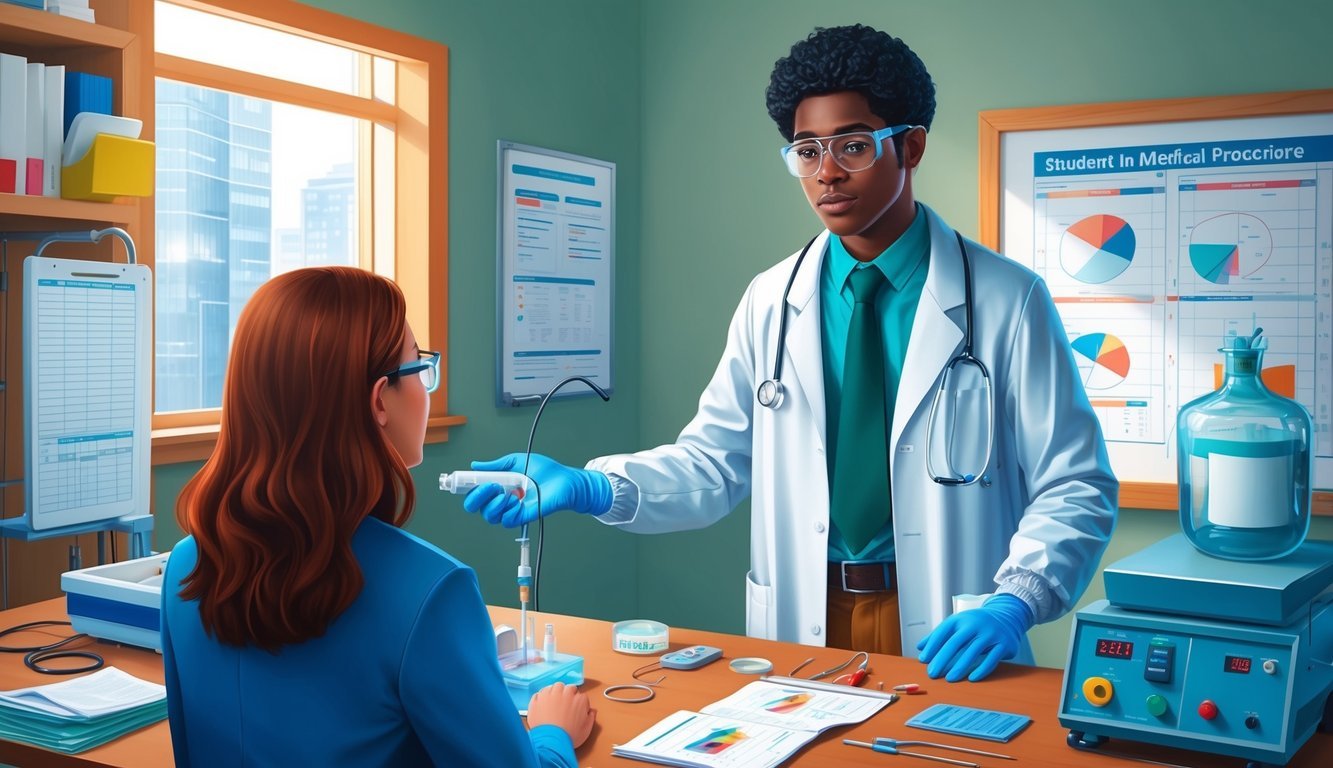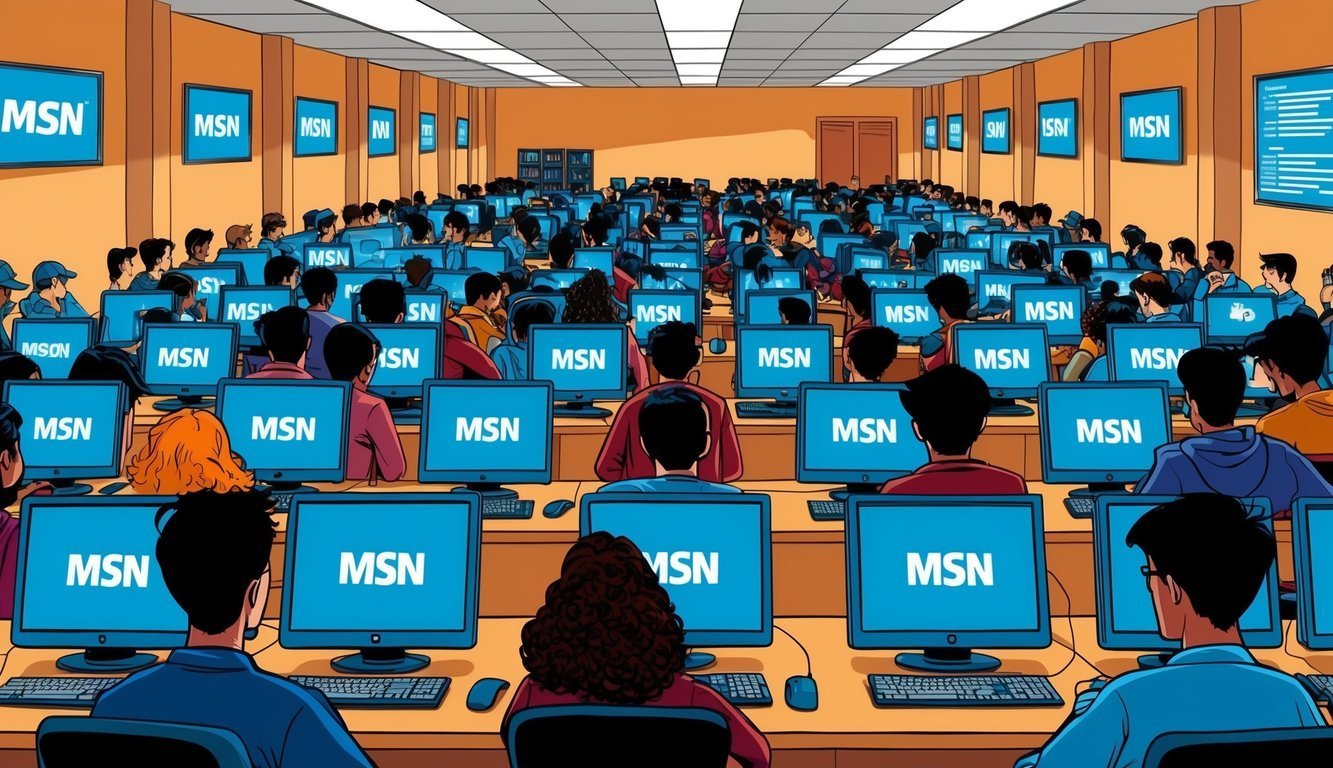Pursuing a Master of Science in Nursing (MSN) is a significant step for advancing your career, but the cost can be daunting.
The cheapest MSN programs provide you with the opportunity to earn your degree without excessive financial strain, allowing you to focus on your education and future career.
Many online MSN programs are designed to be affordable while maintaining high educational standards.
This means you can excel academically without breaking the bank.
When searching for affordable online MSN programs, you can discover options that offer various specializations, from Nurse Educator to Healthcare Leadership.
Many institutions have tailored their programs to cater to the needs of working professionals.
They often allow for flexible schedules and online coursework.
Whether you want to complete your degree at a pace that suits your lifestyle or are aiming for the quickest route possible, you’ll find reliable options that won’t compromise your financial stability.
To guide you on your journey, we’ve compiled a list of some of the most affordable MSN programs available in 2024.
Exploring these options could lead you to a quality education that aligns with your budget and career goals.
Understanding MSN Programs
A Master of Science in Nursing (MSN) can significantly enhance your nursing career.
This section covers essential aspects, including the degree itself, various specializations, and the differences between online and traditional programs.
What Is an MSN Degree?
An MSN degree represents an advanced level of education in nursing, typically pursued after earning a Bachelor of Science in Nursing (BSN).
This degree equips you with specialized knowledge and skills, making you eligible for advanced practice roles, such as a nurse practitioner or nurse educator.
The MSN program often focuses on both theoretical and practical components of nursing.
It covers areas such as healthcare policy, leadership, and clinical practice.
This broad knowledge allows you to address complex healthcare challenges effectively.
Types of MSN Specializations
When pursuing your MSN, you have the opportunity to specialize in various fields, each tailored to specific career paths.
Popular specializations include:
- Family Nurse Practitioner (FNP): Focuses on family-centered care.
- Nurse Midwife: Offers care related to childbirth and women’s health.
- Nurse Administrator: Prepares you for leadership roles in healthcare settings.
- Nurse Educator: Equips you to teach the next generation of nurses.
- Psychiatric Mental Health Nurse Practitioner: Specializes in mental health services.
- Adult-Gerontology Acute Care Nurse Practitioner: Concentrates on the care of older adults with acute conditions.
Selecting the right specialization plays a crucial role in shaping your career trajectory, aligning your passion with professional opportunities.
Online vs. Traditional MSN Programs
Choosing between online and traditional MSN programs largely depends on your personal circumstances and learning preferences.
Online MSN Programs:
- Offer flexibility to balance work and study.
- Often designed for working professionals, allowing you to learn at your own pace.
- Many programs, such as those from Walsh University and Sacred Heart University, deliver high-quality education entirely online.
Traditional MSN Programs:
- In-person classes foster interaction and networking opportunities.
- Provide hands-on experiences through clinical placements.
Both formats have their pros and cons.
You should evaluate your goals, work commitments, and preferred learning style to select the best option for your career advancement.
Evaluating Program Costs

Understanding the costs associated with pursuing a Master of Science in Nursing (MSN) is vital for making an informed decision.
Factors such as tuition rates, financial aid options, and hidden expenses can significantly impact your overall investment.
Tuition Rates and Financial Aid
Tuition rates for MSN programs can vary widely.
Here’s a quick comparison of some of the more affordable options you might consider:
| Institution | Estimated Tuition per Credit |
|---|---|
| University of Alabama | $400 |
| Baker University | Competitive rates |
| Georgetown University | $2,440 |
Federal student aid is available to help manage costs.
You can apply through the FAFSA, which determines your eligibility for grants, work-study funds, or low-interest loans.
Researching programs that accept federal aid can provide you with more financial flexibility as you pursue your degree.
Scholarships and Aid for Nurse Practitioners
Numerous scholarships are specifically aimed at students entering the nursing field.
As a Nurse Practitioner (NP) candidate, look for scholarship opportunities that fit your profile.
Some noteworthy options include:
- HRSA Scholarships: These funds aim to support students in underserved areas.
- State-Specific Grants: Many states offer financial aid for nursing students to promote workforce development.
You should also consider seeking out professional organizations, such as the American Association of Nurse Practitioners (AANP), which offer financial assistance programs and resources to enhance your funding options.
Hidden Costs of MSN Programs
Many prospective students overlook additional expenses associated with MSN programs.
Consider the following potential costs:
- Textbooks and Study Materials: These can range from a few hundred to over a thousand dollars each semester.
- Clinical Supplies: Depending on your specialization, costs for scrubs, equipment, and insurance may arise.
- Technology Fees: Online programs often charge extra for platform access.
Being mindful of these hidden costs ensures you’re fully prepared for your financial commitment.
Understanding the interplay between tuition, scholarships, and ancillary expenses can help you strategize your finances effectively.
Accreditation and Quality Standards

Accreditation is essential for ensuring the quality of your education in nursing programs.
Being enrolled in an accredited program signifies that you are receiving education that meets industry standards.
Here are the key aspects to consider regarding accreditation and its importance.
Understanding Accreditation
Accreditation is a process that evaluates educational institutions and their programs against established quality standards.
It indicates that a program has undergone rigorous scrutiny to ensure its academic credibility.
There are two main types of accreditation: institutional and programmatic.
Institutional accreditation evaluates the entire institution, while programmatic accreditation focuses specifically on certain programs, such as nursing.
Attendance at an accredited school is often required for earning licenses and gaining employment in the nursing field.
Accredited nursing programs often boast better graduation rates and employability for graduates.
Key Accrediting Bodies
Two primary accrediting bodies oversee nursing programs: the Commission on Collegiate Nursing Education (CCNE) and the Accreditation Commission for Education in Nursing (ACEN).
| Accrediting Body | Focus Area | Accreditation Type |
|---|---|---|
| CCNE | Baccalaureate and Graduate Nursing Programs | Programmatic |
| ACEN | All Levels of Nursing Education | Programmatic |
These organizations ensure programs meet strict academic and professional standards.
Programs accredited by these bodies are often recognized in various states, making it crucial for you to choose one that is accredited.
Impact of Accreditation on Graduation
Accreditation has a significant impact on graduation rates and student outcomes.
Schools with proper accreditation usually have higher graduation rates due to the quality of education and support services provided.
Generally, accredited programs offer resources such as academic advising, tutoring, and hands-on experiences that enhance your learning journey.
Without attending an accredited program, you may face challenges, including difficulty in transferring credits or being ineligible for licensing exams.
In summary, choosing an accredited nursing program is vital for ensuring that you receive a quality education, which ultimately enhances your career prospects in the nursing field.
Practical Experience and Clinical Rotations

Practical experience through clinical rotations is vital in nursing education, providing essential hands-on skills.
You will engage in intensive training, preparation for advanced practice roles, and development of key health assessment competencies.
Importance of Clinical Hours
Completing clinical hours is a crucial requirement for your Master of Science in Nursing (MSN) degree.
These hours allow you to apply theoretical knowledge in real-world settings, enhancing your skills as a registered nurse.
Typically, MSN programs require between 500 to 1,000 clinical hours, including direct patient care.
Acquiring this experience not only fulfills your program’s requirements but also prepares you for licensure and future nursing careers.
Clinical hours can also significantly impact your competencies in advanced health practices, making this aspect of your education indispensable.
Online Coursework and In-Person Requirements
Many MSN programs incorporate a hybrid model, combining online coursework with in-person clinical requirements.
In this format, you may engage in flexible online classes while still fulfilling hands-on training.
An essential part of your education is attending in-person clinical rotations, where you interact directly with patients and healthcare teams.
This exposure helps bridge the gap between theory and practice.
You’ll typically need to complete a minimum number of supervised clinical hours, often guided by an experienced preceptor, to ensure that you gain valuable insights and skills.
Advanced Health Assessment Techniques
In advanced practice nursing, mastering health assessment techniques is critical.
During your clinical rotations, you’ll learn to conduct thorough assessments covering physical exams, patient histories, and diagnostic tests.
You may engage with various scenarios that challenge your analytical skills and clinical judgment.
Emphasizing accurate assessments prepares you for the complexity of patient care in your future nursing roles.
This training is fundamental, as it impacts both patient outcomes and your overall effectiveness as a healthcare provider.
Through these practical experiences, you will become proficient in skills necessary for both immediate patient care and long-term professional development.
Career Opportunities and Advanced Roles

Pursuing a Master of Science in Nursing (MSN) opens up various advanced practice roles for you.
Here are some key positions you might consider:
| Role | Description |
|---|---|
| Advanced Practice Registered Nurse (APRN) | Provides specialized care and may focus on specific populations. |
| Nurse Practitioner (NP) | Diagnoses and treats various health conditions autonomously. |
| Clinical Nurse Specialist (CNS) | Offers expert care and consultations in specific clinical areas. |
| Nurse Educator | Teaches and mentors future nursing professionals. |
| Executive Nurse Leader | Develops policies and leads healthcare teams within organizations. |
| Healthcare Leadership | Manages healthcare systems and drives improvements in patient care. |
With your MSN, you can pursue certifications in various specialties, enhancing your qualifications.
These certifications may include:
- Family Nurse Practitioner (FNP)
- Adult-Gerontology Nurse Practitioner (AGNP)
- Nurse Executive Certification
Each role requires strong leadership skills and a solid understanding of healthcare dynamics.
Engaging in healthcare leadership prepares you for higher responsibilities within nursing.
You may also consider advancing further with a Doctor of Nursing Practice (DNP).
This degree allows for even greater influence in clinical practice and leadership.
Career advancement not only improves your professional status but also increases your potential for higher salaries and job satisfaction in the ever-evolving field of nursing.
Exploring different avenues can lead you to fulfilling roles that match your interests and expertise.

